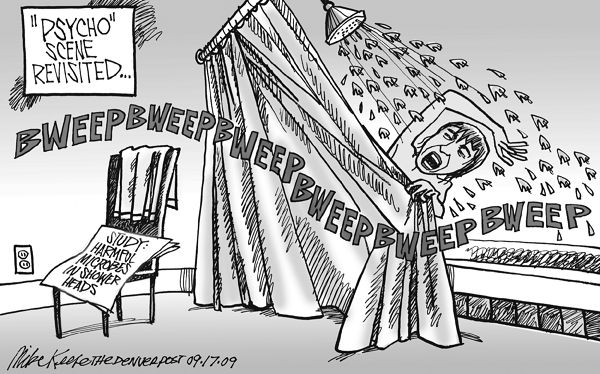Team:INSA-Lyon/Safety/Ethics/Challenges
From 2010.igem.org
Daily problems and ethical challenges
SynBio implies various ethics problems. Some are usual scientific problems, others are quite new. One of the challenges of the ethics in SynBio is to bring a legal framework, to avoid scientists to play God. It is not to do the same mistake as with the GM.
Are we playing God?
One of the usual scientific problems is the use of science in bioterrorism. Nowadays, the terrorist threat is a daily risk. But it evolves, and pretends to use biology and SynBio to make some new weapons. One of these risks is the use of pandemic viruses. For example, some biologist advantage of recreating some eradicated virus, like the polio one or Spanish influenza one. The aim of such research should concern the development of new vaccines, in case of the emergence of a new like-virus, or the study of antigenic shifts in virus... But the impact of a biological attack would be unimaginable: billions of dead people before the administration of an efficient vaccine. And the problem of SynBio is that there is no need of a real structure, a real laboratory. There is a story, which the journalists like: just by making a phone call and giving some DNA sequences he got on internet, this journalist succeeded to take delivery at his home of the small pox virus. This is the kind of facts that discredit all the efforts made by the scientists to reassure the public.

Furthermore, the biohackers, as they have been called, are people who succeed in making some SynBio in their home. And we can’t keep from thinking to an old story, of a crazy scientist giving life to a new creature, made by assembled pieces… Indeed, the parallel with the Mary Shelley’s creature, Frankenstein, is striking… And that’s why some rules have to be established, to avoid the creation of real Wookies or Gremlins, because authorities will be incompetent in the control of these new kinds of life.
In our third project , we planned to realize an anticipated and oriented evolution. In the animals, Fatty-Acid-Synthase is a multi-domain enzyme. It’s a very efficient way to synthesize fatty acids like Eicosa-Pentanoic Acid, involved in brain metabolism and prevention of Alzheimer disease. But in bacteria, this multi-domain enzyme doesn’t exist, and production of such lipids is not very efficient. That’s why we try to model a bacterial FAS, to over expressed important lipids for biomedical area. It would be a real medicinal solution for many cerebral diseases. But it corresponds in an oriented evolution. During billions of years, bacterial never express such a multi-domain enzyme, whereas animals evolve in other way… Is it our right to induce this change? And we always get at the same questions: can the human kind orient the Life the way they need it to, the way they want it to? Are we orienting or disorienting the Evolution? Will we reorient Life our way to just make profits? Some societal and religious fundaments are involved in these questions, and it is a tough subject to talk about. And the problem of the competence of the persons making SynBio is engaged. Can the genetic manipulation be the fact of anyone? In the future, will it be a license which allowed people to create life? Will it be free, like open sources software?

Jack Bauer Vs SynBio ? Bioterrorism, open-sources and fairer world
It brings another usual scientific problem: the misappropriation of the science progress to make some weapons. It exists since the beginning of the world: the fire, the powder, the nuclear energy … Will SynBio be the next? A trivial application, maybe like our system of regulation, could become a part of a bioweapon? It’s clear that an international regulation is necessary. But who is the most competent and able to create and apply it: government, scientists, public? A consultation with all the actors will be a first step in this process.
To fix it, we have to consider as well the problem of the intellectual property. Nowadays, SynBio doesn’t have rules. The biobricks sent to MIT are open sources, but some of the products of others researches are patented. The principal problem of the open sources is the access to sequences which can be used in war act. And with the potentiality of all these sequences, new weapons can be made with any of them. The development of free data base, like NCBI, allows people to make comparison between sequences or genomes, and then some predictive biology. This brings us back to the development of IT. Internet and Banks help biologists to communicate and to have information quickly. But then, this spreading of information allows anyone to get it. In lots of fields, to slow down the Internet machine is out of control. Everything can become free to download and you can find whatever you want. And the following step is the use of the SynBio to synthesize the wanted organisms… All the consequences depend on the persons. Students like us, try to make predictive biology to synthesize a multi-functional enzyme, to improve the health of some patients. Terrorists, or governments, can synthesize the virus or the bacteria of the future…

Is it really safe to let all these sequences open sources? At the first look, it sounds like a non-sense! But open-source biology can be the solution for the developing countries. In the objectives to overcome the occidental weight and develop their own products, SynBio can be a way to get this freedom. The small needs of infrastructures and devices, the different priorities between North and South, which allow them to develop the products they need, like anti-malaria or anti-HIV (C subtype, essentially present in developing countries, whereas A and B subtypes are found in rich countries and are the target of actual researches) drugs, without being dependent of the patent and multinational companies. Patent seems safer, but intensifies the dependence North/south.
There is an example, stuck in the head of anyone: the GM corn. Because of a corn gone sterile by genetic manipulation, farmers were dependant of an American company and had to buy corn every year at this company to continue their production. In this case, patent is a synonym of slavery… And open source biology can be a way to abrogate this. We can deepen this parallel with the GM, because it represents a sum of errors to avoid. Whereas GM is based on the modification of an existing organism, SynBio consists on the designing of new types of life. The tools and methods are different: trials and errors for the first, software programming for the second… And the implications in the biodebate are totally different:
Table 2
 "
"


